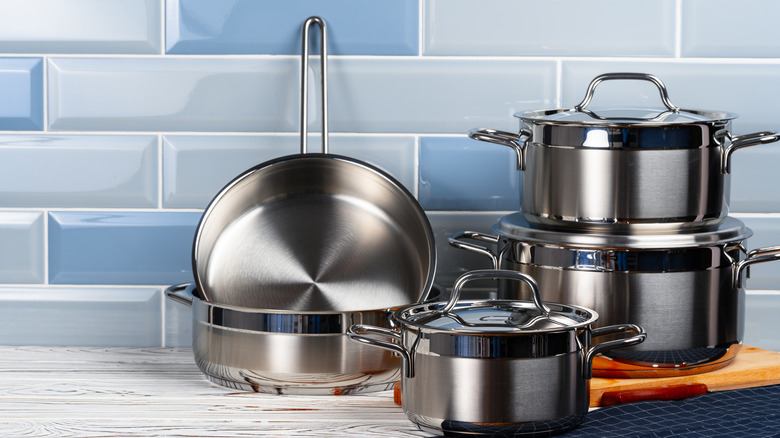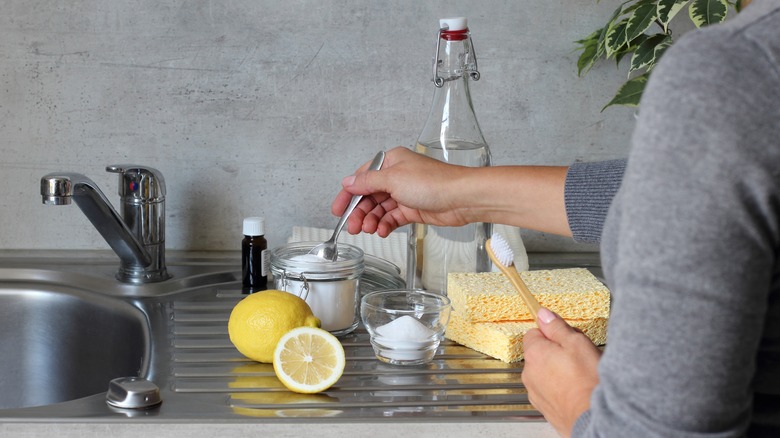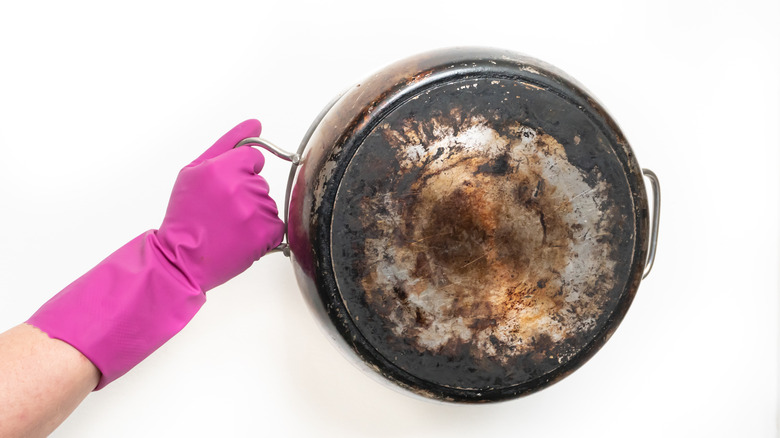The Best Way To Clean Aluminum Hardware
Aluminum is one of the Earth's most plentiful metals. And yet, according to Aluminium Leader, pure aluminum does not exist naturally. Instead, it forms alloys with other elements. The resulting product is soft, lightweight, and flexible, but paradoxically strong and durable. It does not rust and resists corrosion. Aluminum is primarily derived from bauxite, and in the past was sometimes referred to as silver obtained from clay. It was first collected through the process of electrolysis, and today it is still obtained through electrical processes.
Aluminum is also relatively simple to clean. Whether oxidized, tarnished, or merely tainted by burnt-on food, aluminum can easily be restored to its original shiny state. A mild cleaning routine using natural household items is usually all it takes to effectively restore aluminum hardware, and it will succeed with items that are brushed, cast, or hammered. Likewise, soiled utensils, pots, pans, and appliances can all be successfully cleaned using only soap and water, per Texas Restaurant Supply.
When the mess calls for added cleaning power, however, vinegar and other acid-based products work wonders. A simple mix of water and vinegar may be the best way to go for stubborn stains, and you can boost their power by boiling them together in the offending pot. Never use anything abrasive on aluminum, and avoid strong alkalis. You may have to graduate to a commercial cleaning product if discoloration persists, but generally speaking, nothing stronger than the natural household ones needs to be in your arsenal.
Natural cleansers are best
A reaction between aluminum and oxygen will create aluminum oxide and discolor the metal's surface, explains Vintage Trailer Supply. Use a homemade acid-based solution to remove the offending coating. Love To Know suggests preparing a 50-50 mixture of water and white vinegar, then soaking a cloth in it and rubbing the oxidized surface in a circular motion. If discoloration persists, step up the cleaning using either a paste made from a tablespoon of cream of tartar and a dollop of water, or one-third baking soda and two-thirds lemon juice.
Stubborn areas can be rubbed with a half lemon coated with salt, and you can even attack them with denatured alcohol. According to How To Clean Things, lemon juice is sticky and will attract hair and dust, so make sure to rinse thoroughly. If food is burnt on cookware, simply fill the item with water, boil, then scrape. Repeat as necessary, adding tomato or lemon juice to the formula. A non-abrasive cloth or a soft toothbrush (perhaps sprinkled with salt) can be used to scrub.
A borax paste will work on tarnished items. Aluminum hardware that can be unscrewed and taken off cabinets, such as knobs and pulls, can be submerged in the cleansing solutions. If treating hardware or utensils in this manner, an aluminum pot is best. Vinegar or strong acids can potentially damage the surfaces of other metals, warns Tool Digest. An hours-long or overnight bath in soapy water is also effective for cleaning aluminum hardware.
More aluminum cleaning tips
If benign natural cleaning methods fall short, commercial aluminum cleaners and polishers can step into the breach. However, they can be detrimental to health and the environment. Some require safety measures when in use, emphasizes Rxmechanic.com. Gloves, an N-95 mask, and eye protection may be needed. A well-ventilated area is essential, with children and pets kept at a distance. Start conservatively before turning to the chemicals, and avoid resorting to old-school remedies such as chlorine bleach or muriatic acid. Once successfully restored, a routine cleaning of your aluminum hardware will help to maintain the shine.
Dry your cleaned hardware and other items to a fault, as limescale is a threat to wet aluminum. Keep in mind not all aluminum is dishwasher safe, so when in doubt, hand wash and dry. Steer clear of ammonia and harsh bleach. Distinguish between unfinished aluminum and aluminum that is painted or lacquered. Specific cleaning instructions for coated metal may take precedence over the general protocols.
Interestingly, aluminum can be used to clean tarnished silver, according to Our Pastimes. Place a crumpled sheet of aluminum foil into a baking dish filled with water and baking soda (2 tablespoons per quart of water). Using a take-out or deli aluminum tray instead of the baking dish is a good alternative. Drop in the silver items and boil the solution. Let stew for 5 minutes. The chemical reaction that occurs is a workable silver cleaner.


